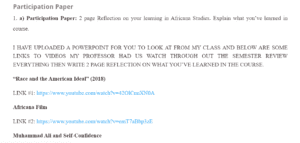Africana Studies
Africana studies involve studying people of African heritage, their culture, socioeconomic evolution, political beliefs, and Black consciousness. Therefore, it paints a clear picture of political struggles, the fight for civil rights, Black nationalism, Black psychology, racism, Black power and economy, black art and films, and Black leadership. The objective is to understand the experiences of African people and people of African heritage around the world. Accordingly, focus on race and gender has developed based on individual identity, difference, and representation. Therefore, it combines social sciences and humanities in the study that elaborates on the lives, cultures, political beliefs, socioeconomic evolution, psychology, racism, Black creativity in art and film, Black power, economy, and leadership.
Culture diversifies individuals. This diversity is a result of the varying traits and behaviors of people of different cultures. Accordingly, attributes such as religious practices, mode of dressing, political beliefs, preferred mode of communication, social activities, and values are associated. Therefore, individual identity is dependent on cultural background. Africana studies, thus, elaborates the cultures and values of people of African heritage to help people of African heritage understand their background cultures and values that influence self-determination and identity. Consistently, Africana studies have enabled the learning and understanding of cultures and values of people of African heritage.
Black creativity in art and film is an area of study in Africana Studies. The ability to create art and film was once impossible, yet it became possible to create films and shows that depicted the lives of African Americans. The film ‘Black Girl’ of 1972 is an excellent example of Black creativity. The film focuses on a family that illustrates the situations in most households whereby most relatives hold each other back instead of building each other up. The films and shows depict some of the standard practices, such as dancing and singing. Therefore, African studies have allowed the learning and understanding of Black creativity in arts and films.
Africana studies have expounded the understanding of racism. The most significant contributor to racism is slavery. The origin of all African Americans was the slave trade that occurred many years ago. Slavery contributed to the idea that people were not equal, as some were superior to others. This idea has been overtaken by time as people believe they are equals and are united. However, racism still exists, illustrated in the killing of unarmed African American men, leading to the formation of the Black Lives Matter Movement. This movement advocates for the lives of African Americans, and their achievements are evident in society currently. Additionally, slavery, racism, and discrimination against African Americans influence their psychology. The incomplete self-identity influenced by the inconclusive cultural background evokes psychological challenges in African Americans. Additionally, injustices in society influence Black psychology. Therefore, Africana studies enabled the understanding of the causes and effects of racism on Black psychology.
Africana studies also elaborated on Black power, economy, and leadership. Initially, African Americans only got basic jobs such as janitors and couldn’t land important jobs, leading to poverty among them. Economic breakthroughs only came around once demonstrations against slavery, segregation, and oppression were successful. These demonstrations led to the rise of leaders such as Martin Luther King, Jr, and Malcolm X, who advocated for equality among people of all races. Female leaders, such as Harriet Tubman and Ida. B. Wells also arose to advocate for civil rights and women’s empowerment. All their accomplishments also led to the election of the first African-American president, Barrack Obama. Therefore, Africana studies enabled an understanding of the challenges, setbacks, and victories of African American leaders and their supporters.
In conclusion, Africana studies promote the understanding of lives led by people of African heritage. Their lives involve different cultures and values, racism and discrimination, their creativity in art and films, their leaders, power, and economic standing. Therefore, Africana studies enabled the learning and understanding of all these aspects of the lives of African Americans to date.
ORDER A PLAGIARISM-FREE PAPER HERE
We’ll write everything from scratch
Question
Participation Paper
a) Participation Paper: 2 page Reflection on your learning in Africana Studies. Explain what you’ve learned in course.

Africana Studies
“Race and the American Ideal” (2018)
LINK #1: https://www.youtube.com/watch?v=42OlCnuXN0A
Africana Film
LINK #2: https://www.youtube.com/watch?v=emT7aBbp3zE
Muhammad Ali and Self-Confidence
Black Psychology & Psychological Well-Being
LINK #3: https://www.youtube.com/watch?v=8QWvBBMtRak
Martin Luther King Jr. & Malcolm X – In Lives & Leaders
LINK#4: https://www.youtube.com/watch?v=9eQXD_44Kso
Malcolm X: Make It Plain Documentary (1994)
LINK #5: https://www.youtube.com/watch?v=csWByunwVI8
Black Power & Black Economics – 1973
LINK #6: https://www.youtube.com/watch?v=MojDoeloUTc
Black Arts- Documentary Depicting Black Creative Expression
LINK #7: https://www.youtube.com/watch?v=SHG60P2ECNk
James Baldwin and Nikki Giovanni in Conversation
LINK #8: https://www.youtube.com/watch?v=eZmBy7C9gHQ
Amiri Baraka (1934-2014) – Black Arts Artist – “Why is We Americans?”

